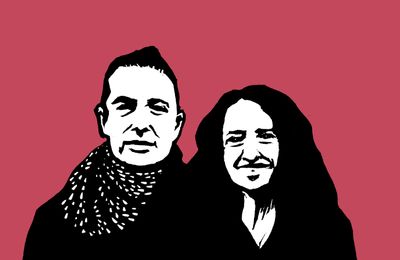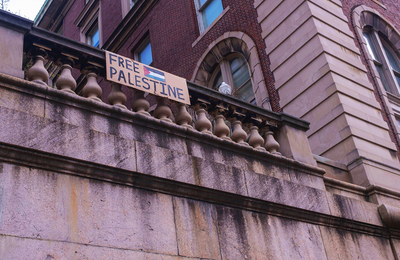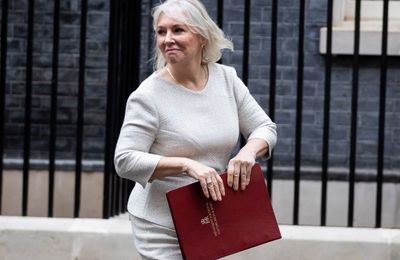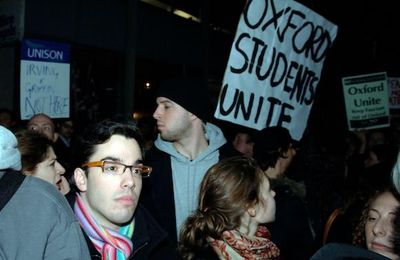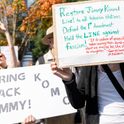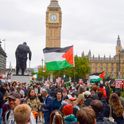Last week I was not a terrorist. This week I am, because I stand with Palestine Action.
Were I to write this or say it, I would be liable to arrest and prosecution under Section 12 of the Terrorism Act 2000, which is punishable by up to 14 years in prison and/or a fine.
It’s worth restating that what was perfectly legal last week, last month and last year is now illegal because last Friday the home secretary, Yvette Cooper, (Home Counties, Oxford, Harvard, London School of Economics, political adviser, MP, government minister) pushed through legislation to proscribe under the Terrorism Act 2000 an activist group co-founded by Huda Ammori.
It probably doesn’t matter to Cooper, but this is not a good look: a rich, powerful, privileged, connected white woman at the stroke of her pen brands as a terrorist and threatens with jail a working-class brown woman born in Bolton, the child and grandchild of Palestinian exiles.
The law applies not only to Huda Ammori and other members of Palestine Action, but to anyone who expresses support for them.
Palestine Action is, by any measure, an unusual candidate for the “terror” tag. It does not have bombs or guns. Its most noteworthy action was to spray red paint on British warplanes at an RAF base.
When the alleged painters go on trial they may want to call on the services of a well-known human rights barrister who 20 years ago, in a separate case, defended Josh Richards. Along with others, Richards had infiltrated RAF Fairford intending to disable bombers heading to Iraq. The barrister and his colleagues argued that their clients’ actions were aimed at preventing illegal war or war crimes and therefore could be legally justified. Two juries refused to convict Richards, and the charges were eventually withdrawn.
This able and persuasive human rights barrister now has a different day job. He is, of course, Keir Starmer, the prime minister who, for reasons as yet unexplained, but perhaps guessable (ambition, opportunism, lack of principle, moral turpitude, general spinelessness and an unfailing commitment to convicted felon, self-confessed sexual abuser, nest-featherer-in-chief and aspiring autocrat Donald Trump), has travelled a long and dark way from fighting the corner of idealistic protesters who risk their liberty, their futures and sometimes their lives to shine a light on the glaring injustices they see around them.
What does the Starmer of the Fairford Five trial make of the older, sadder and pitiful 2025 version of himself? We can only assume he avoids watching the unedifying footage of himself and his colleagues (Emily Thornberry, for example, another “human rights” lawyer) as they squirm to redefine genocide as something other than the blanket bombing of a helpless civilian population, the mass killing of women and children, the destruction of hospitals, schools and places of worship, and the denial of water, food and medical supplies—all as part of a campaign that Israeli politicians and ministers boast is for the purpose of expelling Palestinians.
Genocide appears to fall into what in Ireland we call “the doer, not the deed” syndrome. We shouldn’t get distracted by what’s being done, even if it’s mass killing. The important thing is who’s doing it. If it’s our guy, it can sometimes be a little embarrassing, especially if he gets caught or says the quiet things out loud, but it’s generally nothing to get too worked up about.
Putin is not our guy so after the full-scale invasion of Ukraine Starmer was quick to urge the creation of a “Nuremberg-style” tribunal for war crimes. Netanyahu, however, is very much our guy, so obviously that means there’s no need for any kind of tribunal. British lawyers, including New Labour stalwart Baroness Helena Kennedy, are facing serious potential US sanctions because they served on the International Criminal Court’s expert legal panel that advised on the arrest warrants for Netanyahu and former Israeli defence minister Yoav Gallant, among others, for alleged war crimes in Gaza. I may not have been listening hard enough, but I haven’t heard Starmer rushing to the defence of Kennedy (whom he knows well) and her fellow panel members.
During the Balkan Wars, the Serbs were not our guys, so Starmer, that indefatigable defender of human rights, felt able to argue at the International Court of Justice in 2014 that legal definitions of genocide depend on proof not only of destructive acts but also of the intent to destroy a group or a part of a group, which often means the court must assess motive. He pressed for a broader, more inclusive interpretation under the Genocide Convention. That’s all a bit embarrassing now, given that the scale of destruction in Gaza goes far beyond the horrors inflicted by Serbian forces besieging Vukovar that Starmer was highlighting.
But let’s not waste any more time on this pathetic, cringe-inducing little man who can see red paint sprayed on warplanes and government buildings, but apparently not the blood gushing from tens of thousands of Palestinians. Who can hear chanting at Glastonbury, but not the screams of the maimed and incinerated, or the howls of grief and rage from survivors. Who is offended by Kneecap but not by the genocidal statements of senior Israeli politicians and cabinet ministers.
Let’s go back to the Alice in Wonderland levels of dystopia in which we now live, when it is today a terrorist offence to say “I stand with Palestine Action” but it is perfectly acceptable to cheer on the Israeli Defense Forces (which were formed in the late 1940s partly from actual terrorist gangs—Irgun, Haganah and Lehi—that killed British soldiers in Palestine and carried out multiple, documented atrocities against Palestinians during the Nakba in 1948) in their merciless and systematic massacre of Gazans.
What Black Mirror world are we living in when it is a terrorist offence to say, “I stand with Palestine Action?” If last week—or last month, or last year or a decade ago—I had put a bomb in, let’s say, Downing Street, or an RAF airbase, I would, correctly, have been charged with a terrorist offence. The same would happen, correctly, were I to place a bomb there next week, or the week after. Or at any time. The act is the same. Everyone recognises it for what it is.
So, what has changed to make a five-word statement—“I stand with Palestine Action”—a terrorist offence, when last week it was legal, but this week is so dangerous that it merits up to 14 years in prison? The act is the same.
Could it possibly be the doer and not the deed? If you’re the government and you like the doer, the doer can keep on doing what he’s doing. But if you’re the government and you don’t like the doer, and the doer keeps on doing what he’s doing, you can send the doer to jail. Let’s be honest, this has nothing to do with terrorism. This is all about who our guys are.
Back in 1974, in response to an IRA bombing campaign in England that left several dozen dead and maimed (mostly) civilians, the Labour government under Harold Wilson rushed through parliament the Prevention of Terrorism (Temporary Provisions) Act (PTA) with the promise that this draconian legislation would be repealed when it was safe to do so. The act was never dropped, but instead strengthened.
We can’t know if the PTA saved any lives, but we do know that it wrecked many, as innocent Irishmen and women were railroaded through the courts in a climate of state-induced moral panic. They spent years in prison before eventually being released by the Court of Appeal, among them the defendants in the notorious Guildford Four, Birmingham Six and Maguire Seven miscarriage of justice cases. (As a footnote, in 1977 I was myself arrested under the legislation and held without charge in Armley and Brixton prisons while appealing an “exclusion order” with which the government hoped to deport me back to Belfast; I won the appeal, with the help of Harriet Harman, who was at that time the legal officer of the National Council of Civil Liberties, now Liberty.)
In 2000, Tony Blair revised the “temporary” provisions of the 1974 legislation, granting the police even greater powers of arrest and surveillance. During the debates, Jack Straw, a home secretary notorious for being influenced by the security services, blithely reassured MPs that the new super-charged act would not be used against protestors. (Another footnote: Harriet Harman, by then a “Blair babe”, MP and Solicitor General, voted for the new act. Starmer is not the first to walk this deeply rutted walk of shame, from upholder of the right to protest to authoritarian enforcer. Historically, Labour has cloaked its clampdowns in the language of public order and national security—from the 2000 Terrorism Act to the introduction of Asbos and extended detention without trial.)
Despite Straw’s assurances, protest has not just been criminalised, it is now terrorism. Direct action, of the kind practised by Palestine Action, has always been complicated because it often involves law-breaking to some (usually minor) degree. But before anyone reaches for the smelling salts, it’s worth remembering that it is part and parcel of protest in democratic nations, deployed by, for example, the Suffragettes in the years before the First World War in pursuit of votes for women; by Freedom Riders in 1961 agitating for civil rights and an end to segregation in the US; by Gandhi’s Salt March in 1930 in India to protest against British colonial taxes; by Peter Hain (now Lord Hain), who organised attacks on cricket pitches to protest against apartheid in South Africa. All of these actions were illegal at the time, punishable by law. None of them was considered a terrorist offence.
To repeat: simply to say the words “I stand with Palestine Action” is now an offence. If I were to say those words, I could be sent to jail. So could you. And so could you, and so could you. And so could everyone.
I’m a screenwriter so my imagination sometimes turns to film and drama when I’m thinking about what’s going on around me. In this case, I’m thinking of the 1960 classic Spartacus, directed by Stanley Kubrick and written by Dalton Trumbo.
In the 1950s Trumbo served nearly a year in federal prison in Kentucky during the McCarthy witch-hunt because he had been a member of the American Communist Party. He, like many others brought before the House Un-American Activities Committee, refused to cooperate and name his comrades in the party in return for his freedom.
It was an experience he parlayed into Spartacus’ magnificent final sequence when Roman general Crassus (played by Laurence Olivier) demands that the captured slaves identify their leader, Spartacus. Before Spartacus (Kirk Douglas) can stand, one by one, his fellow slaves rise and each declares: “I am Spartacus!” Every time I see the film the hairs on my arms rise. It’s all about solidarity, defiance and sacrifice.
Today, there’s no slave revolt underway, but there is a sustained government-led assault on our fundamental liberties, including the right to protest and the right to free speech. There is a chance for all of us to have our Spartacus moment.
Obviously, it would be a terrorist offence for me or for you to say or write “I stand with Palestine Action”. We would be picked off, bullied and threatened, and possibly go to jail. Protestors with cardboard signs saying the same thing have already been arrested and charged under the less serious but still appalling Section 13 of the legislation. Section 13 allows for no defence arguing justification, and can lead to six months in prison. Above all, it attaches a “terrorist” label for life to anyone convicted. I applaud them.
Which brings me to another movie reference: The Front (1976), written by my close friend Walter Bernstein, who died in 2021. Like Trumbo, Walter was blacklisted during the postwar McCarthyite reds-under-the-bed hysteria. Together with director Martin Ritt (also blacklisted) and star Zero Mostel (yes, also blacklisted), Walter uses scathing satire to expose this shameful and traumatic period in American history.
In the film, Woody Allen plays Howard Prince, a small-time bookie with no political affiliations (without, really, a single political thought in his head) who winds up fronting scripts from blacklisted writers trying to make a living. Howard is eventually hauled before the House Un-American Activities Committee and questioned closely about his associations and beliefs. Reluctant—understandably—to follow Trumbo and so many others to jail, Howard ducks and dives, tries to box clever and jumps through convoluted verbal hoops to avoid incriminating himself. But his interrogators are relentless. They demand names.
In the end, Howard runs out of road and is cornered into choosing between betrayal and self-incrimination. He tells the committee, “You know what, fellas? Go fuck yourselves.” And off he goes to jail.
So, do I stand with Palestine Action? In the spirit of Walter’s Howard Prince and in the spirit of Trumbo’s Spartacus, I say this: Mr Starmer, Ms Cooper, go fuck yourselves and fuck your legislation too.

